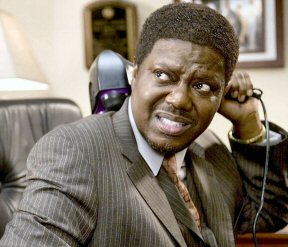March 27, 2005
“Guess Who” – A Movie Review
A Comedic Remake of A Tired Cliché
By Fred H. Arm
 In a reversal of the premise of the classic film masterpiece, "Guess Who's Coming to Dinner," the movie that shocked the racially insensitive public back in 1967, has been remade as a domestic farce, yet not nearly so scandalous or shocking as its celebrated predecessor. This time around, the dinner has been replaced by an entire weekend, and the crusty, over-protective and suspicious father who must overcome his prejudices is played by a black man (Bernie Mac), originally performed by Spencer Tracy. His daughter's fiancé, performed originally by Sidney Poitier, who was a Yale educated doctor, is now a stockbroker played by Ashton Kutcher and is white. The mother is played by Judith Scott of the old “Bill Cosby Show” fame and was featured in the original film by Katherine Hepburn. Incidentally, "Guess Who's Coming to Dinner" was the last Hepburn/Tracy film for that famous duo venerated by audiences around the world. Therein lies the question of whether the new version is evidence of social progress or simply of cultural decline.
In a reversal of the premise of the classic film masterpiece, "Guess Who's Coming to Dinner," the movie that shocked the racially insensitive public back in 1967, has been remade as a domestic farce, yet not nearly so scandalous or shocking as its celebrated predecessor. This time around, the dinner has been replaced by an entire weekend, and the crusty, over-protective and suspicious father who must overcome his prejudices is played by a black man (Bernie Mac), originally performed by Spencer Tracy. His daughter's fiancé, performed originally by Sidney Poitier, who was a Yale educated doctor, is now a stockbroker played by Ashton Kutcher and is white. The mother is played by Judith Scott of the old “Bill Cosby Show” fame and was featured in the original film by Katherine Hepburn. Incidentally, "Guess Who's Coming to Dinner" was the last Hepburn/Tracy film for that famous duo venerated by audiences around the world. Therein lies the question of whether the new version is evidence of social progress or simply of cultural decline.
One would conceivably have to admit to a bit of both. On the side of progress, it seems that the racial hang-ups and pieties that made the earlier "Guess Who's Coming to Dinner" both necessary and dreadfully stiff have become more relaxed, since interracial love is not the shock or the big deal it once was. As for cultural decline, well, the fiancé played by Ashton Kutcher is pretty much representative of how far we have sunken in that regard. 
Yet, one cannot fault the essence of this cinematic farce without biting the tongue. For one thing, the first “Guess” movie, important and popular as it was, is really not that great a movie by today’s standards. On the other hand, "Guess Who," directed by Kevin Rodney Sullivan ("Barbershop 2") from a screenplay written by David Ronn, Jay Scherick and Peter Tolan, is so mild and thin that it hardly inspires much excitement at all. Although I would give the dinner table scene a notable exception as well as another really funny shtick is when Percy’s other daughter comes home, sees the white fiancé there with the family, and exclaims, “Oh my God, are we being audited?” The comedic attempts, such as the differences between men and women, the sexual orientation of the party planners, and the comical effects of alcohol are clichéd treks rather than creative adventures.
So what remains is a potentially interesting premise as a cross-racial, possible buddy comedy alienated by the continuous confrontation between Mac's bigoted overbearing persona and Kutcher's wimpy and spacey affability. The two performers do their best, however the writing is so tired and the direction so draggy that their collisions never acquire that much momentum.
 Mac's character, Percy Jones, is a New Jersey loan officer about to renew his marriage vows with Marilyn, his wife of 25 years (Judith Scott). Percy's older daughter, Theresa (Zoë Saldaña), is arriving from New York with her boyfriend, Simon (Ashton Kutcher) for the repeat of the vows event. Theresa has failed to inform her family that Simon is white, and Simon has not told her that he just quit his job at a blue chip investment bank. These two oversights provide fuel for the skirmishes to follow, which conclude in the usual relationship-threatening rebukes and are followed by, just in the nick of time, clichéd reconciliation.
Mac's character, Percy Jones, is a New Jersey loan officer about to renew his marriage vows with Marilyn, his wife of 25 years (Judith Scott). Percy's older daughter, Theresa (Zoë Saldaña), is arriving from New York with her boyfriend, Simon (Ashton Kutcher) for the repeat of the vows event. Theresa has failed to inform her family that Simon is white, and Simon has not told her that he just quit his job at a blue chip investment bank. These two oversights provide fuel for the skirmishes to follow, which conclude in the usual relationship-threatening rebukes and are followed by, just in the nick of time, clichéd reconciliation.
Kutcher plays a affable, yet ineffective young man engaged to a striking black woman and is absurdly prevented from sleeping with her by Percy Jones's sharing a sofa bed in the basement with this would-be son-in-law in order to protect his daughter's honor.
Simon, who proclaims he grew up without a father in another subtle reversal of stereotype, is quite frustrated by Percy's bullying, nevertheless he honors Percy’s demanding values. The constant bullying, by Percy, although not as brutal as Robert De Niro's treatment of Ben Stiller in "Meet the Parents," is nevertheless continuous and aggressive. The harassment ultimately crests at the dinner table when Percy and his father goad Simon into telling racist jokes thus provoking him to cross the line and finally taking offense after a few zingers tweak their ire.
The rest of the film is not nearly so rash, yet its insipidness has less to do with caution than with uninspired encouragement. In the simple, prosperous setting in the New Jersey suburb, what intolerance remains may easily be laughed off. "Guess Who" credibly insinuates that racial relations have improved considerably since “Guess Who’s Coming To Dinner” came out in 1967, which may be one of the reasons this movie doesn’t quite reach the inspired level of its predecessor. And again, the Spencer Tracy, Katherine Hepburn, and Sidney Poitier combo is quite a hard act to follow.